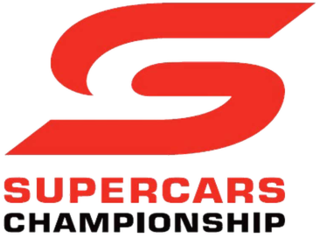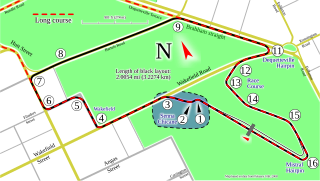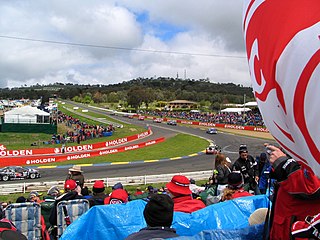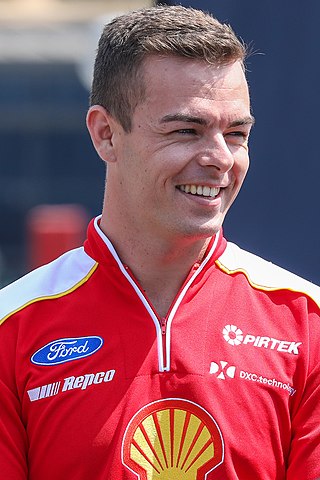
The Supercars Championship is a touring car racing category in Australia and New Zealand, running as an International Series under Fédération Internationale de l'Automobile (FIA) regulations, governing the sport.

The Adelaide 500 is an annual motor racing event for Supercars held on the streets of the east end of Adelaide, South Australia between 1999 and 2020 and again from 2022. The event uses a shortened form of the Adelaide Street Circuit, the former Australian Grand Prix track. The event is still colloquially known as the Clipsal 500 or simply "Clipsal" after its former longtime sponsor. By attendance and number of events, the Adelaide 500 is the biggest multiple-day car race in Australia.

Jamie Whincup is an Australian professional racing driver competing in the Supercars Championship. He currently is team principal for Triple Eight Race Engineering. He has driven the No. 88 Holden ZB Commodore, won a record seven Supercars championship titles, four Bathurst 1000 victories, and a Bathurst 12 Hour victory. Whincup is the all-time record holder in the Supercars Championship for race wins, at 125 career wins. He is also the first driver to win the Jason Richards Memorial Trophy twice at Pukekohe Park Raceway in Auckland, New Zealand.

Motorsport is a popular spectator sport in Australia, although there are relatively few competitors compared to other sports due to the high costs of competing. The oldest motorsport competition in Australia is the Alpine Rally which was first staged in 1921 followed by the Australian Grand Prix, first staged in 1928. The most widely watched motorsport category is Supercars, especially at the Bathurst 1000. Other classes in Australia include Australian GT, Formula 3 and Formula Ford, Superbikes, as well as various forms of speedway racing.

Shane Robert van Gisbergen, also known by his initials SVG, is a New Zealand racing driver. He competes part-time in the NASCAR Cup Series, driving a Chevrolet Camaro ZL1 for Trackhouse Racing as well as part-time in the NASCAR Xfinity Series and NASCAR Craftsman Truck Series for a yet to be announced team. He is known for his time racing in the Supercars Championship, last driving the No. 97 Chevrolet Camaro ZL1 car for Triple Eight Race Engineering. He is a three-time Supercars Champion, winning driver's titles in 2016, 2021, and 2022. With a total of 80 wins and 46 pole positions, van Gisbergen is 4th on the all-time wins list in the Supercars Championship. He has won the Bathurst 1000 three times, in 2020, 2022, and 2023.

Fabian "Fabs" Coulthard is a British-born New Zealand professional race car driver, currently competing in the Repco Supercars Championship, who will drive as an endurance co-driver for Nick Percat with Walkinshaw Andretti United. Fabian is a second cousin of former Formula One driver David Coulthard.

The Gold Coast 500 is an annual motor racing event for Supercars, held at the Surfers Paradise Street Circuit in Surfers Paradise, Queensland, Australia. The event has been a regular part of the Supercars Championship — and its previous iteration, the V8 Supercars Championship — since 2010.

The 2013 International V8 Supercars Championship was a Fédération Internationale de l'Automobile-sanctioned international motor racing series for V8 Supercars that was based in Australia. It was the fifteenth running of the V8 Supercar Championship Series and the seventeenth series in which V8 Supercars contested the premier Australian touring car title. The championship was contested over thirty-six races, starting with the Clipsal 500 Adelaide on 2 March 2013, and finishing with the Sydney 500 on 8 December. The series' calendar also expanded, travelling to the United States for the first time for a race at the Circuit of the Americas in Austin, Texas.

The Auckland SuperSprint was an annual motor racing event for Supercars, held at Pukekohe Park Raceway in Pukekohe, New Zealand. The event was a regular part of the Supercars Championship—and its previous incarnations, the Shell Championship Series and V8 Supercars Championship—since 2001.

The 2015 International V8 Supercars Championship was an FIA-sanctioned international auto racing series for V8 Supercars. It was the seventeenth running of the V8 Supercar Championship Series and the nineteenth series in which V8 Supercars have contested the premier Australian touring car title.

The 2016 International V8 Supercars Championship was an FIA-sanctioned international motor racing series for Supercars. It was the eighteenth running of the Supercars Championship and the twentieth series in which Supercars have contested the premier Australian touring car title.

The 2016 Coates Hire V8 Supercars Challenge was a motor racing event for V8 Supercars, held on the weekend of 17 to 20 March 2016. The event was held at the Melbourne Grand Prix Circuit in Melbourne, Victoria, and consisted of one race of 60 kilometres in length and three races of 65 km in length. It was a non-championship event, contested by teams taking part in the 2016 International V8 Supercars Championship, and was held in support of the 2016 Australian Grand Prix. The event was the 31st running of the V8 Supercars Challenge.

The 2018 Supercars Championship was an FIA-sanctioned international motor racing series for Supercars. It was the twentieth running of the Supercars Championship and the twenty-second series in which Supercars have contested the premier Australian touring car title. Teams and drivers competed in thirty-one races at sixteen venues across Australia and New Zealand for the championship titles. Scott McLaughlin won his maiden title at the final race in Newcastle, while Red Bull Holden Racing Team won the Teams Championship at Pukekohe.

The 2019 Supercars Championship was the twenty-first running of the Supercars Championship and the twenty-third series in which Supercars have contested the Australian Touring Car Championship, the premier title in Australian motorsport. The 2019 championship also included the running of the 1,000th Australian Touring Car Championship race, which was contested at the Melbourne 400.

The Melbourne SuperSprint is an annual motor racing event for Supercars, held at the Albert Park Circuit in Melbourne, Victoria since 2018. The 2018 edition was the first time that a championship round was contested at the circuit, after several years of supporting the Australian Grand Prix as a non-championship event. The event was cancelled in 2020 and 2021 due to the COVID-19 pandemic.

The 2018 Melbourne 400 was a motor racing event for the Supercars Championship that was held on the weekend of 22 to 25 March 2018. The event was run at the Melbourne Grand Prix Circuit in Melbourne, Victoria, and marked the first running of the Melbourne 400. It was the second event of sixteen in the 2018 Supercars Championship and consisted of two races of 130 kilometres, and two races of 70 kilometers. The races were run in support of the 2018 Australian Grand Prix and marked the first time that the Supercars support races would be a points-paying round of the Supercars Championship.

The 2019 Melbourne 400 was a motor racing event for the Supercars Championship held as a support event to the 2019 Australian Grand Prix from 14 March to 17 March 2019. It was held at the Melbourne Grand Prix Circuit and consisted of two races of 70 kilometres and two races of 130 kilometres. It was the second event of fifteen in the 2019 Supercars Championship and the second running of the Melbourne 400 event.
The VHT S5000 Australian Drivers' Championship is a current open-wheel road racing series in Australia. The series was created by a merger between two proposed series, Formula Thunder 5000 and Super5000. The series is promoted by the Australian Racing Group.

The 2020 Supercars Championship was a motor racing series for Supercars. It was the twenty-second running of the Supercars Championship and the twenty-fourth series in which Supercars have contested the Australian Touring Car Championship, the premier title in Australian motorsport. Due to disruption caused by the COVID-19 pandemic, a number of rounds were rescheduled or cancelled.

The 2021 Supercars Championship was a motor racing series for Supercars. It was the twenty-third running of the Supercars Championship and the twenty-fifth series in which Supercars have contested the Australian Touring Car Championship, the premier title in Australian motorsport. Atlanta-based international auto parts conglomerate Genuine Parts Company, through the consumer auto parts brand Repco, replaced Virgin Australia as naming rights sponsor under a five-year partnership, which was later expanded to eight years at the end of the 2022 prizegiving banquet.

















